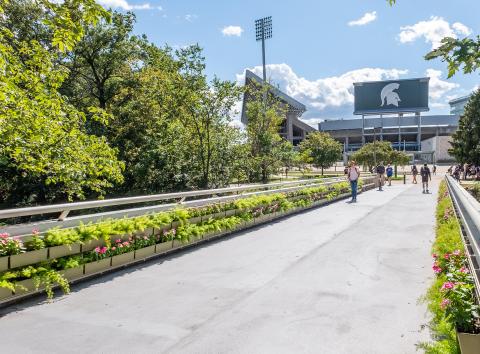Re-engaging international partners to address global environmental challenges at Michigan State University
The Environmental Science and Policy Program (ESPP) is an umbrella for environmental research and graduate education at Michigan State University (MSU), working together with colleges and departments across campus in a collaborative manner to solve environmental problems at home and abroad. It addresses emerging and pressing global environmental challenges that require multi-sectors and multi-disciplines through interdisciplinary sciences and policies at multiple scales across the globe. As part of MSU’s endeavor to become a “World Grant University” and address the UN’s Sustainable Development Goals (SDGs), ESPP together with the Asia Hub program in the International Studies and Programs (ISP) and the Center for Global Change & Earth Observations, has actively been engaging in the water-energy-food nexus research and education, with a specific focus on the climate variability and food security in key vulnerable regions in the world.
Among others, MSU is leading an effort in addressing the emerging  and long-standing regional sustainability challenges in water, energy and food nexus (WEF Nexus) in Asia, one of the core themes of the UN’s SDGs and Future Earth’s priority KANs (Knowledge Action Network). The established Asia Hub, launched in 2017 with Nanjing Agricultural University and other 22 international partner institutions in the region, is leading an effort to cope with the challenges imposed upon by the increasing climate variability in Asia and by the pandemic, by addressing the nexus of the agricultural food production, water use efficiency, hydropower dam construction, urbanization and regional economic disparities. Funded by different agencies multi-scale activities are being carried out with our Asia partners to disseminate science, technologies and policy recommendations to the local stakeholders, ranging from climate and hydrological modeling to land use and land cover change analysis, lake and wetland dynamics, hydropower dams assessments, agricultural irrigation, deforestation and livelihood changes in Asia. The broad global environmental challenges that Asia Hub is addressing include:
and long-standing regional sustainability challenges in water, energy and food nexus (WEF Nexus) in Asia, one of the core themes of the UN’s SDGs and Future Earth’s priority KANs (Knowledge Action Network). The established Asia Hub, launched in 2017 with Nanjing Agricultural University and other 22 international partner institutions in the region, is leading an effort to cope with the challenges imposed upon by the increasing climate variability in Asia and by the pandemic, by addressing the nexus of the agricultural food production, water use efficiency, hydropower dam construction, urbanization and regional economic disparities. Funded by different agencies multi-scale activities are being carried out with our Asia partners to disseminate science, technologies and policy recommendations to the local stakeholders, ranging from climate and hydrological modeling to land use and land cover change analysis, lake and wetland dynamics, hydropower dams assessments, agricultural irrigation, deforestation and livelihood changes in Asia. The broad global environmental challenges that Asia Hub is addressing include:
- Water-energy-food-land nexus in Asia
- Human interventions to hydrological processes of Lower Mekong River Basin
- Land use and land cover changes and implications to food, energy and water systems
- Regional climate change and its variability
- Science and technologies for solutions to food, energy and water nexus challenges
- Adaptation strategies and regional governance of water, energy and food systems
Did you know?
Michigan State University has been recognized for its significant progress toward meeting the United Nations’ Sustainable Development Goals. MSU is ranked No. 26 globally and No. 1 in the U.S. for SDG 17, “Partnerships for the Goals.”
Source: MSU Today MSU ranked highly for global impact on sustainable development